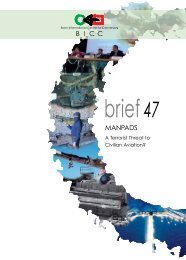egypt-final-presidential-elections-2012
egypt-final-presidential-elections-2012
egypt-final-presidential-elections-2012
Create successful ePaper yourself
Turn your PDF publications into a flip-book with our unique Google optimized e-Paper software.
The Carter Center<br />
Presidential Election in Egypt<br />
senior leadership as well as replacing the June 17<br />
constitutional addendum with a new addendum.<br />
President Morsi’s addendum effectively fully restored<br />
the executive office of the presidency, granted<br />
legislative powers to the president in the absence<br />
of a People’s Assembly, and allowed the president<br />
to appoint a new constituent assembly to draft a<br />
constitution should the current assembly be prevented<br />
from performing its duties. While these moves will<br />
undoubtedly have a lasting impact on the future role<br />
of the military in formal politics and Egypt’s struggle<br />
to produce a civilian-led government, they do not<br />
change the fundamental problem that has continued<br />
to plague Egypt’s transition from the start: the lack of<br />
a constitution that protects fundamental rights and<br />
ensures checks and balances of power.<br />
President Morsi has asked the Egyptian people to<br />
place their trust in him to deliver on the longer-term<br />
goals of the popular uprising, which include building<br />
the foundation for genuinely democratic politics. It<br />
is incumbent upon newly elected President Morsi to<br />
do everything in his power to move Egypt toward a<br />
greater stability by laying this foundation. This can<br />
be done by ensuring an inclusive and transparent<br />
constitutional drafting process<br />
by a constituent assembly that<br />
enjoys popular legitimacy and is<br />
afforded the opportunity for full<br />
and complete debate and discourse<br />
on the content of the constitution<br />
and Egypt’s political future.<br />
In addition, President Morsi must<br />
turn over legislative power to a<br />
democratically elected parliament<br />
as soon as possible. Finally, the<br />
success of the transition will require<br />
guaranteed respect for and protection<br />
of the fundamental civil and<br />
political rights of all Egyptians by<br />
a democratically elected, civilian<br />
government.<br />
The Carter Center and the<br />
Presidential Election<br />
The Carter Center was present for both rounds of<br />
the <strong>presidential</strong> election. However, its mission to<br />
witness the election was limited in scope due to<br />
restrictions imposed on election witnesses by Egypt’s<br />
electoral authorities. The Carter Center election<br />
witnessing mission in Egypt was accredited by the<br />
Presidential Election Commission (PEC) on May 3,<br />
<strong>2012</strong>. Accreditation badges, necessary for witnesses<br />
to observe the process, were provided on May 16,<br />
less than seven days before the first round of the<br />
<strong>presidential</strong> election. In addition to the delayed issuance<br />
of accreditation badges, witnessing regulations<br />
included a provision that witnessing missions could<br />
not issue statements prior to polling, and it imposed<br />
a 30-minute time restriction on witnesses’ presence<br />
inside polling stations and prohibited witnessing the<br />
<strong>final</strong> aggregation of the results.<br />
Due to these restrictions imposed upon election<br />
witnesses by Egypt’s electoral authorities, the Center<br />
was unable to assess critical pre-election phases,<br />
including voter registration, candidate nomination,<br />
Former U.S. President Jimmy Carter and former First Lady Rosalynn Carter, with<br />
field officer director Sanne van den Bergh, observe poll closing on May 24, <strong>2012</strong>.<br />
Deborah Hakes<br />
3



